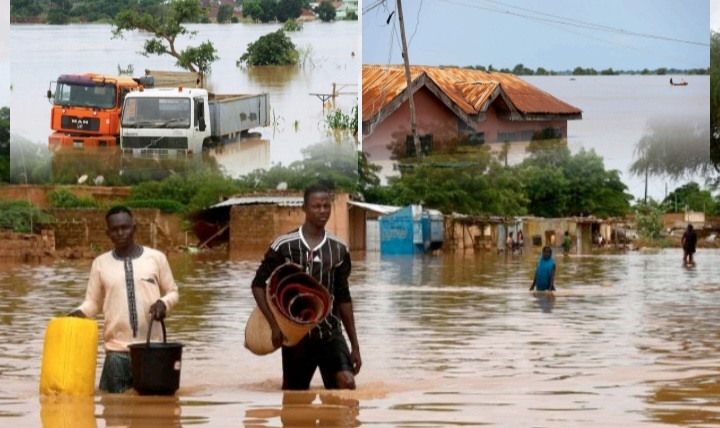Rising Waters: Communities Across Nigeria Adapting to Unprecedented Flooding

By Faridat Salifu
As the specter of climate change looms large over Africa, communities across the continent grapple with the multifaceted challenge of climate adaptation. From inventive solutions for single-use items to extending the lifecycle of plastics, and the stark reality of living in flood-prone areas, African residents are navigating diverse approaches to cope with the daily impact of a changing climate.
Trademore Estate Abuja Battling the Unyielding Waters
In the heart of Abuja, Trademore Estate has found itself at the center of a persistent battle against flooding. This residential estate has faced years of demolition warnings due to recurrent flooding, turning it into a disaster-prone area. Despite these challenges, the resilient residents have chosen to confront the reality of living with water during the rainy season. The inundation of water, once a nuisance, has now become an unwelcome visitor, causing significant disruptions to daily life.
Coexisting with Water
From Lagos to Ondo
The plight of Trademore Estate mirrors the experiences of many communities along Nigeria’s coastline. From Makoko in Lagos to Ayietoro in Ondo state, Nigerians are bravely embracing the reality of cohabiting with water. Makoko, often referred to as the “floating city” on the edge of Lagos, is home to nearly 200,000 residents who reside in some 2,200 shanty buildings mounted on stilts in a lagoon off the Lagos mainland. Mere kilometers away from Victoria Island, the bustling financial hub, Makoko is a testament to the resilience of its inhabitants.
Despite being labeled an informal settlement and inner-city slum, Makoko boasts operational schools, bustling markets, places of worship, and rudimentary power sources that serve the community’s needs. In stark contrast, Ayietoro, a coastal city in Ondo, is a shadow of its former self. Established in 1947, it once thrived with the Atlantic Ocean as its neighbor. However, as the sea levels continue to rise and recurrent ocean surges displace its residents, the “Happy City” is now on the verge of vanishing.
According to the 2006 census, Ayietoro’s population was approximately 30,000. Today, in 2023, it barely scrapes 5,000. Over half of the town, including homes, schools, and cemeteries, now rests below sea level, a testimony to the relentless force of water.
A Region in Crisis West Africa’s Flood Woes
The challenges faced by these communities are part of a larger regional crisis. Floods have wreaked havoc across Nigeria, Cameroon, Chad, and Niger, leading to a humanitarian catastrophe. Government inaction in investing in preventive infrastructure has amplified the suffering. The most affected regions are agricultural districts that serve as the region’s food supply, particularly rice fields. This has led to a looming health and nutrition crisis, with cholera outbreaks spreading among already displaced communities.
In response to the growing threat of climate change and rising waters, proactive measures are crucial Allocate resources to build resilient infrastructure, including flood barriers and drainage systems.
* Implement effective early warning systems for timely alerts and evacuations.
* Promote sustainable urban development that considers climate risks.
* Educate communities on flood risks and preparedness.
* Offer affordable flood insurance options to aid recovery.
* Invest in projects like reforestation and wetlands to mitigate floods.
* Support farmers with climate-resilient practices.
* ICollaborate globally to address climate change.
* Develop and update disaster preparedness plans.
* Reduce greenhouse gas emissions to slow climate change.
* Empower communities with resilience-building initiatives
* Invest in climate research for better risk assessments and preparedness.
A comprehensive approach, involving governments, communities, and international cooperation, is essential to tackle rising waters and climate challenges effectively.
